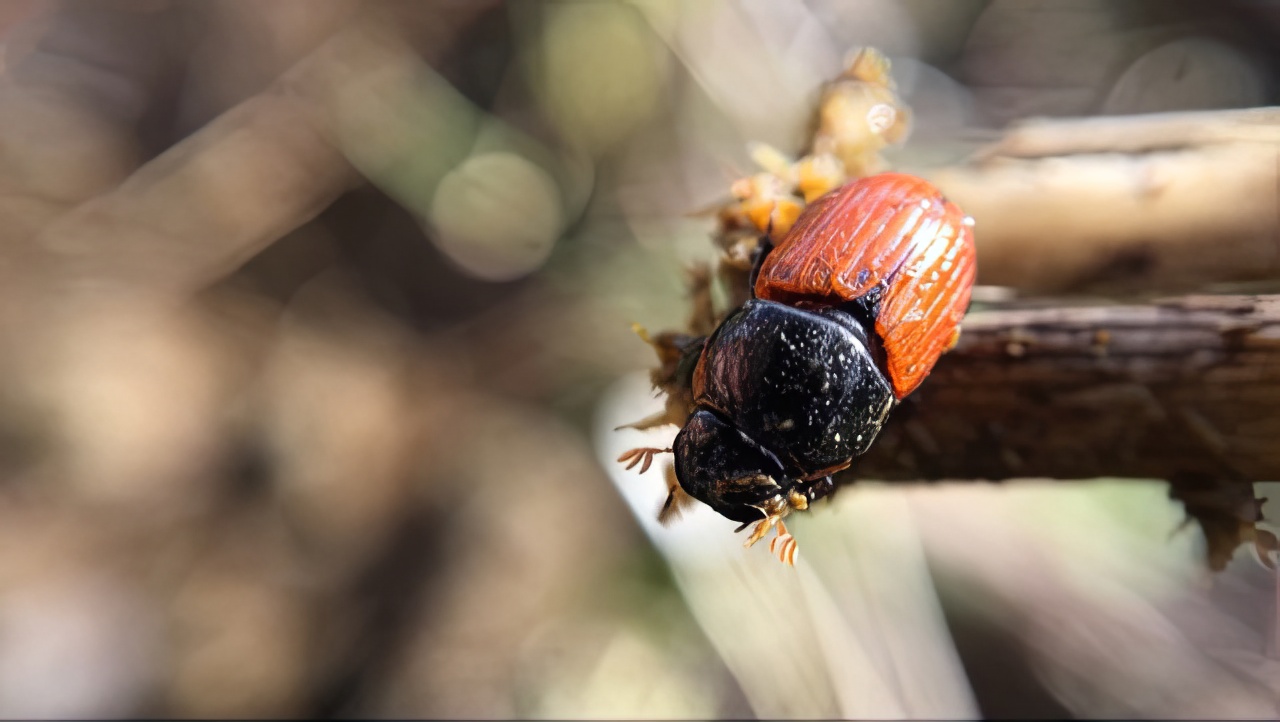You might not find fresh manure very exciting, but it doesn’t get much better for a dung beetle. Dung beetles belong to a family of insects better known as scarabs.
So Many Reasons To Like Dung Beetles

Aphodius fimetarius found on TomKat Ranch. Photo: Doug Millar
02/28/2024
By: Wendy Millet
 You might not find fresh manure very exciting, but it doesn’t get much better for a dung beetle. Dung beetles belong to a family of insects better known as scarabs. A keystone species, dung beetles play a vital role in functioning ecosystems. The main types of dung beetles are tunnelers, dwellers, and the famous rollers. Held in high esteem since the time of ancient civilizations, these ecosystem engineers are designed to effectively decompose dung from all types of animals. Whether they live off the juice of a dung pie (some adults), or bury their brood balls (manure with an egg inside of it) they play a key role in nature’s system for cycling animal dung.
You might not find fresh manure very exciting, but it doesn’t get much better for a dung beetle. Dung beetles belong to a family of insects better known as scarabs. A keystone species, dung beetles play a vital role in functioning ecosystems. The main types of dung beetles are tunnelers, dwellers, and the famous rollers. Held in high esteem since the time of ancient civilizations, these ecosystem engineers are designed to effectively decompose dung from all types of animals. Whether they live off the juice of a dung pie (some adults), or bury their brood balls (manure with an egg inside of it) they play a key role in nature’s system for cycling animal dung.
The “work” of these hard-working creatures includes removing dung where pests breed and multiply, turning dung into a storehouse for nutrients then burying dung “ball” in the soil where it can feed soil microbes, building fertility, and reducing off-gassing. Dung beetles also perforate the soil with myriad tunnels improving water infiltration. One experiment in the Adelaide Hills of Australia found that water pollution, in the form of run-off from farm fields, was virtually eliminated three months after dung burial was complete.
By breaking down manure, dung beetles also control the composition of insect populations. In a ranch context, this is excellent news both ecologically and economically. The dung beetles’ work combined with good grazing management naturally eliminates the need for dewormers commonly used in the livestock industry. The chemicals in dewormers are meant to reduce parasite and fly larvae populations however they also impact many other insects all of which have a role to play in healthy soil and nature’s food chain for animals and birds.
As Pete Bauman explains, dung beetles are early users of dung pats and can have a significant impact on the rest of the arthropod community. “The dung beetles colonize the new dung pats and feed on the liquid portion of the dung. When water becomes limited, they move on to other dung pats, leaving behind tunnels and often their eggs in or underneath the dung. As the dung beetle larva develop, they feed on the drier fibrous portion of the dung pat.” As dung dries out, predators move in. Spiders and other predators can utilize dung beetle tunnels as they seek out larvae of pest insects.
Learning the benefits of dung beetles and understanding their important role in soil health has been an ongoing fascination for many of us at the ranch. Some years ago, we learned that dung beetles reduce methane fluxes. More recently, we have been participating in a study that explores that topic in more depth. Suzanne Lipton, Ph.D. a student at the University of California Santa Cruz (UCSC) is investigating the effect of dung beetle abundance and diversity on soil microbial diversity and carbon sequestration in soils of three ranches in the Central Coast region of California, including TomKat Ranch. The fieldwork involves setting up enclosures in recently grazed fields that are then populated with Onthophagus taurus (a tunneling dung beetle) and cow dung both collected on the ranch. These enclosures were monitored over two months, as are dung beetle populations in the surrounding area. The results of this study will be available later this year.
There are likely many more reasons to appreciate dung beetles that we have yet to learn about. Many countries already have concentrated efforts to breed and distribute dung beetles to expand their impact and good work. We look forward to continuing to follow these tiny little creatures of the soil and the researchers who are helping us understand what they do!